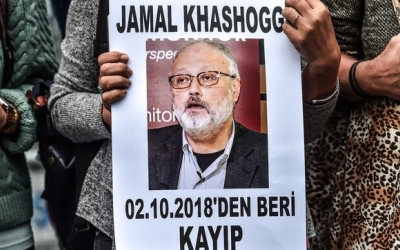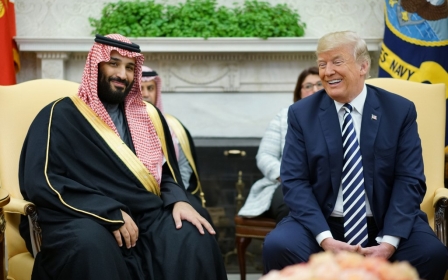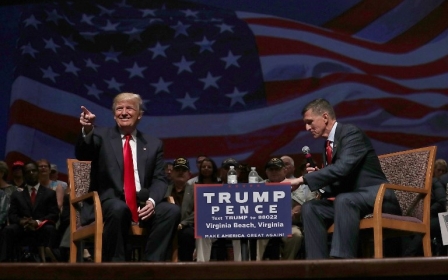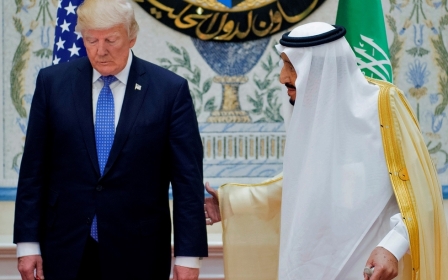Trump aides with Gulf interests had 'outsized influence' over US-Saudi policies, report finds

US energy firms and aides to Donald Trump lobbied the White House to help Saudi Arabia obtain nuclear technology and advance their own business interests, a new congressional report found.
The document, released on Monday by the House of Representatives' Oversight Committee, said the Trump administration allowed the president's friends to "wield outsized influence over US policy towards Saudi Arabia".
The report focuses on the lobbying efforts of Tom Barrack, Trump's personal friend and informal adviser, accusing him of "promoting the interests of US corporations seeking to profit from the transfer of nuclear technology to Saudi Arabia".
Barrack, the report says, was also "taking steps for his own company, Colony NorthStar, to profit from the same proposals he was advancing".
The lobbying in question took place from 2016 onwards, the report said.
Paul Manafort, Trump's former campaign chairman, and Michael Flynn, his former national security adviser, were also named in the report as being involved in the pro-Saudi lobbying.
The probe is based on thousands of documents, including emails and internal memos in the Trump administration.
Those documents raised "serious questions" about the White House's willingness to put the personal interests of Trump's friends ahead of US national security and the "universal objective of preventing the spread of nuclear weapons", the committee said.
"Overall, the new documents obtained by the committee reveal that, with regard to Saudi Arabia, the Trump Administration has virtually obliterated the lines normally separating government policymaking from corporate and foreign interests," the report found.
The report says IP3 International, a consortium of US energy companies, pressed the Trump administration to drop demands that Riyadh agrees to the "Gold Standard" before allowing the Gulf kingdom to obtain nuclear technology.
IP3 International is described in the report as a "private company that assembled a consortium of US companies seeking to build nuclear plants in Saudi Arabia".
The Gold Standard sets strict regulations, overseen by the UN nuclear watchdog (IAEA), on countries developing nuclear plants with the help of the United States to ensure that their atomic programmes are used for peaceful purposes only.
Barrack, who has major investments across the Gulf region, served as the chairman of Trump's inaugural committee, which arranged official festivities in Washington to celebrate the new president in early 2017.
He was in communication with IP3 before Trump took the oath of office, according to the report.
Later, he helped introduce US energy companies to Gulf officials.
Trump energy speech
In May 2016, Barrack also shared a draft of an energy speech by then-candidate Trump with Saudi and Emirati officials to "coordinate pro-Gulf language", the report said.
Barrack later sent revisions suggested by an Emirati businessman to Manafort.
"This is probably as close as I can get without crossing a lot of lines. Give me a call," Barrack told Manafort in an email, according to the congressional report.
Manafort was recently sentenced to more than seven years in prison for fraud and tax evasion - charges unrelated to the allegations in the congressional report.
A spokesman for Barrack told the Washington Post on Monday that the businessman is cooperating with Congress's investigation.
The spokesman said Barrack's efforts were focused on improving relations between Washington and the Middle East.
"Mr. Barrack's engagement in investment and business development throughout the Middle East for the purpose of better aligned Middle East and US objectives are well known," the spokesman said.
IP3 did not return MEE's request for comment on Tuesday.
Congressional concerns
US lawmakers have been sounding alarm bells against the transfer of nuclear technology to Saudi Arabia for months.
Those concerns were amplified after the Gulf kingdom's powerful crown prince, Mohammed bin Salman, told CBS News in March that Saudi Arabia would "without a doubt" try to acquire a nuclear weapon if Iran develops one.
In early June, a US senator revealed that the Trump administration issued two authorisations for the transfer of technical "nuclear expertise" to Saudi Arabia after the murder of journalist Jamal Khashoggi on 2 October last year.
The two approvals were issued on 18 October - only 16 days after Khashoggi was killed by Saudi government agents in Istanbul - and on 18 February, respectively.
Known as "Part 810 authorisations", they allow US companies to discuss and work on nuclear-related projects in the Gulf kingdom.
"I have serious questions about whether any decisions on nuclear transfers were made based on the Trump family's financial ties rather than the interests of the American people," US Senator Tim Kaine said in a statement at the time.
Middle East Eye propose une couverture et une analyse indépendantes et incomparables du Moyen-Orient, de l’Afrique du Nord et d’autres régions du monde. Pour en savoir plus sur la reprise de ce contenu et les frais qui s’appliquent, veuillez remplir ce formulaire [en anglais]. Pour en savoir plus sur MEE, cliquez ici [en anglais].





